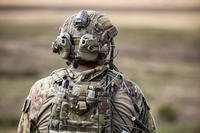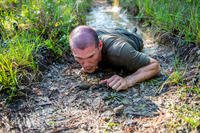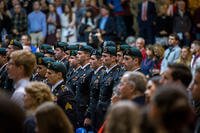USAF Sgt. Maynard H. Smith, Jr. was ten years older than the rest of his B-17 crew and very slight, which might have been disadvantages in any position other than that of ball-turret gunner. On May 1, 1943, he used his maturity and compact frame to his advantage and won a Medal of Honor for his actions that day.
Smith was a replacement gunner for the 423rd Squadron of the 306th Bombardment Group stationed at Thurleigh, England. The May 1 mission against the seemingly impenetrable concrete German submarine pens at Saint-Nazaire on France's west coast was his first. On the bomber's return, it was hit by intense anti-aircraft fire that caused fires in the radio compartment and waist sections.
With the oxygen system and intercom shot, three of the crew bailed out — but Smith chose to stay with the plane and the critically injured tail gunner. Smith fought the fire and administered first aid to his comrade. At one point, he manned the workable guns and threw exploding ammunition out through a hole burned in the fuselage.
Smith then wrapped himself in protective cloth and "completely extinguished the fire by hand," as his citation reads. He threw out anything that wasn't "too hot, too heavy, or bolted down" according to writer John L. Frisbee in an effort to lighten the plane's load-and thus allowed the bomber to limp into a landing at the southwest tip of England.
Six weeks later, Sgt. Smith became the first of only five enlisted men in the Air Force to be awarded the Medal of Honor. After four more combat missions, Smith was diagnosed with "operational exhaustion" and reassigned to a non-combat position as a private. He was honorably discharged from active duty in the Army Air Force on May 26, 1945.















